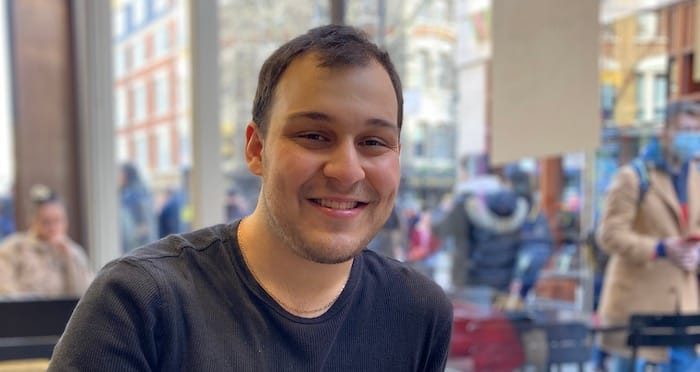Fil Sys would hide his ethnicity when applying for training contracts but now hopes to challenge stereotypes by launching a new support group, he tells us on International Roma Day

In 2019, a government report found Gypsies, Roma and Travellers to be among the most “disadvantaged” people in the country, facing poor outcomes in key areas such as health and education.
The problem goes back centuries but continues to the present day, leading Fil Sys, a proud Romani trainee solicitor, to speak out and set up a group to represent and support the historically marginalised GRT community.
I caught up with Sys to find out more about his campaign, the challenges he faced on his journey into the legal profession, and why he wants the legal sector to be an ally.
Aishah Hussain: Congratulations on securing a training contract and being on your way to qualifying as a solicitor. Looking back on the application process, were there any struggles or stereotypes you had to contend with coming from a Romani background?
Fil Sys: Thank you, and I am grateful to Legal Cheek for giving a platform to Gypsy, Roma and Traveller (GRT) voices.
As a Romani law student, I remember feeling unrepresented in the legal sector and wanting to hide my ethnicity when applying for vacation schemes and training contracts. I wanted to avoid my application being viewed through the prism of stereotypes. Due to GRT communities being labelled criminal, lazy and socially unadaptable throughout history, it was a fear that those socially ingrained stereotypes — not helped by the mainstream media — would undermine my applications. I am sure that there are some GRT students and legal professionals reading this today who have hidden or are still hiding their GRT identities.
Over time, I started to embrace my Roma ethnicity. After all, why should I hide? I remember the sudden realisation that even if I wanted to put my Roma ethnicity on paper, the diversity questionnaire did not have a ‘Roma’ or ‘GRT’ option. For years, I was ‘Other’ followed by ‘give more details’. Final confirmation of how invisible GRT applicants were to recruiters was when I was asked ‘what is Roma?’, somewhat ironically, in an application workshop. Although some applications now include GRT identity, our general inclusion and representation in the legal professional is near non-existent.
AH: Why has the GRT community historically been marginalised?
FS: This could honestly take up the whole interview, such is the vast and multi-layered racism faced by GRT communities. Having migrated from India in around 1,000AD, Roma started settling in Europe from approximately the 14th century. The fact they had darker skin gave rise to racism and even effected the language that majority populations used to describe Roma. For example, it was a popular myth that the Roma were from Egypt due to the colour of their skin — ‘Egyptian’ turned into ‘gitano’ which eventually turned into ‘gypsy’. In Britain, the early hostility towards the Roma culminated in stereotypes that sadly survive to this day and resulted in expulsions under various monarchs.
It is not easy to answer why GRT people have been historically marginalised. However, the by-products of marginalisation are clear to see — prejudice and discrimination. Roma Holocaust memorials have been vandalised in Scotland. Holiday park operators have denied accommodation to families who have ‘Irish Traveller-sounding’ surnames. The British government’s Policing Bill is widely considered by GRT communities to criminalise a traditional nomadic lifestyle. And, the Council of Europe estimated that 50% of all Roma children have faced or will face malnutrition in their lifetimes. Generations of GRT people trapped in a cycle of poverty and discrimination.
AH: As you mention, the government’s new Policing Bill could threaten the culture and way of life of the community. Could you explain the reason(s) for this, and the potential ramifications?
FS: The Police, Crime, Sentencing and Courts Bill (Policing Bill) is widely considered by GRT communities as an attempt to criminalise their traditional nomadic lifestyle and, ultimately, forcibly settle families. The government’s crackdown on ‘unauthorised encampments’ would arguably have a disproportionate impact on GRT families. Where families stop on land which is unauthorised, the police will potentially be able to seize and remove property, including caravans in which families live. This is frightening for many GRT families.
Instead of these changes to the law, charities have asked for these parts of the Policing Bill to be dropped and have called for more authorised camps to be built for families to safely use. Otherwise, families could be uprooted from their way of life, police and GRT relations could further worsen and marginalisation of GRT communities could be further exacerbated. As you can imagine, fierce campaigning and lobbying continues.
AH: Presumably this has all led you to recently launch the Gypsy, Roma & Traveller Lawyers Association. What are the association’s aims and goals for the future?
FS: On joining the legal profession, I wanted to meet fellow GRT legal professionals and join an organisation which would represent and support us. There was no such group in the UK. Two months ago, I established the Gypsy, Roma & Traveller Lawyers Association. We are growing and are looking to welcome all GRT-identifying students who are interested in law, GRT legal professionals and allies.
The next stage is getting the attention of universities, law firms and chambers. Not only do I think that a strong and organised GRT presence in the law can speak up against anti-GRT rhetoric and legislation, but the GRT Lawyers Association can build bridges with other minority groups and public administrations to achieve common goals. Importantly, we hope to be a source of inspiration for the next generation who may think that a career in law is not for ‘people like us’. It is and we want to encourage and support you. I am excited to see what we can do!
Gypsy, Roma & Traveller inclusion in the legal industry is vital. Are you a #GRT legal professional, student or an ally? Please hit that follow button, support us & join our group to ensure a strong GRT voice 👉🏼https://t.co/ycFIaJZzf8📣. #GRTLawyers #equality #lawyers #students pic.twitter.com/9EGOoOUHlK
— Gypsy, Roma & Traveller Lawyers Association (UK) (@GRTLawyersUK) February 4, 2022
AH: Broadly speaking, what more can the legal sector do to make the profession more inclusive for the GRT community?
FS: Give us a voice. GRT students and legal professionals are not included in discussions about how to create a diverse and inclusive legal sector. To this day, I have not seen one diversity and inclusion report which includes GRT people in its stats.
‘Diversity’ should not be an exclusive club and, in order for the legal sector to convert buzzwords into tangible results, GRT students and legal professionals must have a platform. We are very much a forgotten minority in the drive towards diversity in the legal sector.
Legal employers should take the time to learn about who GRT people are, our diverse backgrounds and the unique struggles that GRT students face to be even able to put forward an application. We need the legal profession to be an ally.
AH: Today is International Roma Day 2022 — what are your plans?
FS: Throughout the country, pockets of GRT people will come together to celebrate, commemorate and to campaign for change. International Roma Day is a rally-call to be proud of your GRT identity, to stand up for your rights and share experiences with those outside the community. This is what I will be doing today. Making as many new connections as possible and sharing the amazing work that international and national GRT charities continue to do. I am routinely inspired by other GRT groups and individuals, and it makes me immensely proud to be Roma. Opre Roma!
Happy International Roma Day! 🙌 Be proud of your #GRT identity, continue fighting against stereotypes & #racism and share your experiences with those from outside the community. I am proud to be Roma, and I will not hide. #InternationalRomaDay #8April #RomaAndProud #equality pic.twitter.com/OoyGOZc0AG
— Fil Sys (@filsys_blog) April 8, 2022
Fil Sys is a Romani trainee solicitor in the London office of an international law firm, human rights writer and the founding member of the Gypsy, Roma and Traveller Lawyers Association (UK).



